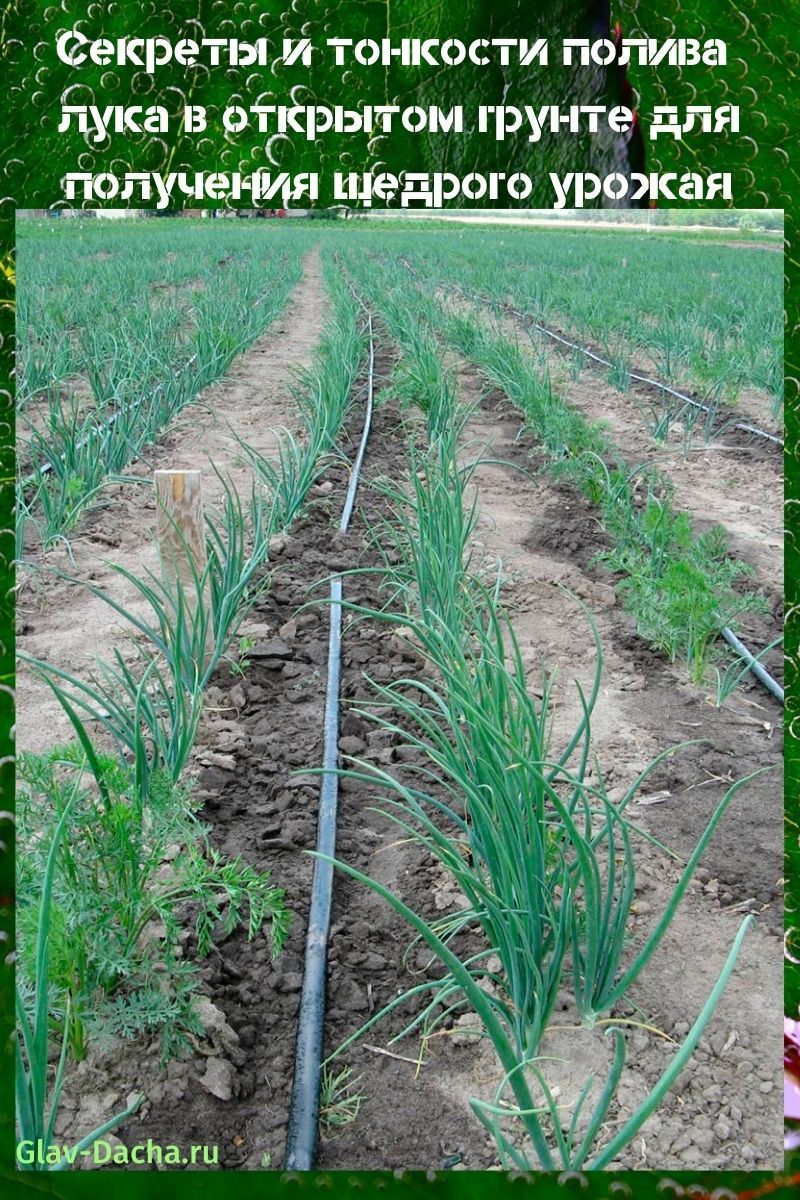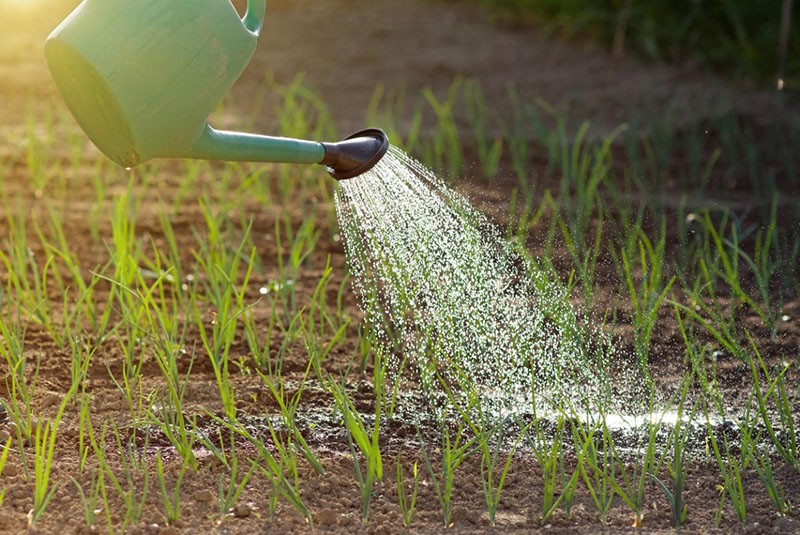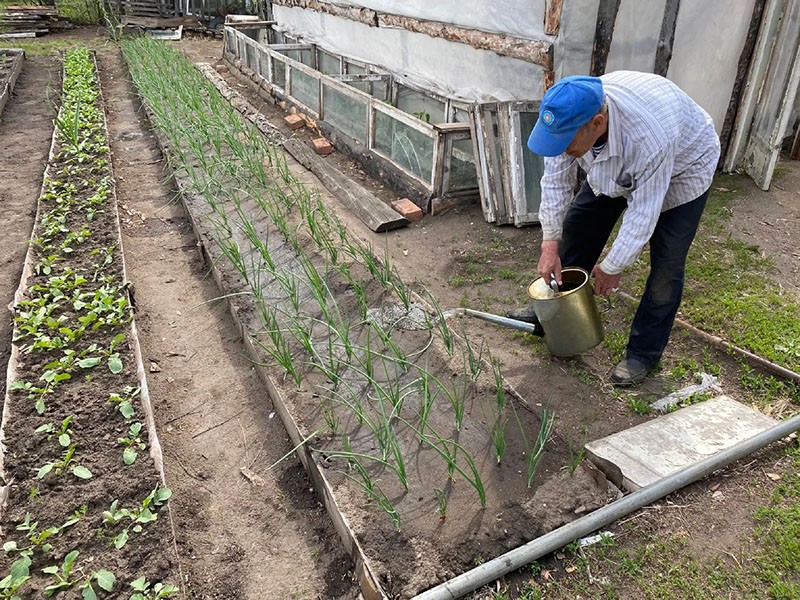Secrets and subtleties of watering onions in the open field for a generous harvest
 Watering onions in the open field is one of the main agrotechnical procedures that ensure active growth and high yields of any vegetable crop. When growing onions, special attention should be paid to watering, because moisture is necessary for a vegetable to develop, but its excess leads to fungal diseases. Therefore, in order to obtain a generous and high-quality onion crop, the basic subtleties of agricultural technology must be observed.
Watering onions in the open field is one of the main agrotechnical procedures that ensure active growth and high yields of any vegetable crop. When growing onions, special attention should be paid to watering, because moisture is necessary for a vegetable to develop, but its excess leads to fungal diseases. Therefore, in order to obtain a generous and high-quality onion crop, the basic subtleties of agricultural technology must be observed.
When to start watering

The first irrigation of onions is carried out just before planting. This is necessary so that the soil subsides slightly and the planted bulbs do not end up on the surface of the soil. For watering, you will need at least 2 buckets of water per 1 sq. m.
Make grooves in the soil, water them and plant the bulbs. Sprinkle the vegetable with a thin layer of soil and water again. It is best to add a little potassium permanganate to the water or Fitosporin - it will help disinfect the soil and prevent the development of diseases.
Many gardeners are interested in whether to water the onions after planting. This is a prerequisite for the active growth of a vegetable. But moisture should be moderate, otherwise the plant may undergo fungal infections that develop quickly in a humid environment.
Irrigation can be started immediately after the first green shoots appear. When watering onions in the open field, you need to monitor the weather conditions - as soon as the sun dries the top layer of the soil, it can be slightly moistened. The best option is 1 watering during the week.
You need to water the onions until the moisture is absorbed into the ground, and the next day, be sure to loosen the soil.
Watering onions in the open field - basic rules
 Growing onions requires compliance with a number of agrotechnical subtleties and nuances. For watering, it is best to use settled, slightly warm water. Cold tap water will not only do no good, but it will also cause serious stress to the plant.
Growing onions requires compliance with a number of agrotechnical subtleties and nuances. For watering, it is best to use settled, slightly warm water. Cold tap water will not only do no good, but it will also cause serious stress to the plant.
How to properly water onions outdoors:
- Water should not get on the green part of the plant and the bulb itself - this can lead to their rotting.
- Water the onion abundantly - the soil should be saturated with moisture by at least 15-20 cm.
- Do not allow the soil to dry out and form a dense crust on its surface.
- Onion beds are best watered in the early morning or late evening. Drops of moisture in direct sunlight can burn young shoots.
- Sprinkling and drip irrigation is considered the best option for onions in open soil.
Watering onions in the open field is carried out for 7-8 weeks from the moment of planting. Irrigation should be stopped 15-18 days before harvesting.
Frequency and rates of watering
 When growing a vegetable crop, you need to consider how often to water onions in the open field. The most important is the irrigation schedule at the stage of rooting, growing green mass and forming the bulb itself.
When growing a vegetable crop, you need to consider how often to water onions in the open field. The most important is the irrigation schedule at the stage of rooting, growing green mass and forming the bulb itself.
The most active onions should be watered immediately after planting in the beds. Care must be taken to ensure that the soil does not dry out.To check, you can use a thin wooden twig - stick it into the ground and carefully examine it. If the twig remains completely dry, the soil must be moistened.
After the bulb reaches the optimum varietal size, the number of waterings must be reduced. And during the ripening period - completely abandon moisture.
This usually happens 2-3 weeks before harvest. In the case of forcing on feathers, the onions must be irrigated throughout the growing season.
Watering rates and frequency depending on the stage of growth and planting scheme:
- Sowing seeds - onions are watered before and after planting, after which about 1 time a week as the soil dries.
- Podzimny sowing - does not require moisture, grows without watering the soil.
- Sevok in spring - for rooting and forming the bulbs of the beds, it is advisable to water every 4-5 days with a water consumption of 7-10 liters per 1 sq. m.
The irrigation rate depends on the structure and quality of the soil, as well as the amount of precipitation. On average, it is recommended to use at least 8-10 liters of water per 1 sq. m. beds.
The benefits of salt water when growing onions
 Drying and yellowing of their green feathers is a common problem when growing onions. Most often, gardeners associate this with insufficient moisture in hot weather and begin to water the beds even more, causing them serious harm.
Drying and yellowing of their green feathers is a common problem when growing onions. Most often, gardeners associate this with insufficient moisture in hot weather and begin to water the beds even more, causing them serious harm.
The most common cause of drying and yellowing of greens is onion fly - its larvae feed on the roots of the plant, causing it to wilt. Watering the onion with salt water, which is carried out three times a season with an interval of 10 days, will help to correct the situation.
After each treatment, the onion must also be watered with clean water.:
- For the first watering, a solution of 5 liters of water and 150 g of sodium chloride is prepared. Onion beds should be processed immediately after the feathers have reached 6-7 cm in height. Onions should be watered at the root, using at least 5 liters of solution per square meter. m.
- The second processing of onion plantings is carried out after 10 days. The amount of salt increases to 400 g per bucket of water.
- For the third watering of the onion, the volume of table salt is increased to 600 g.
 The number of treatments and the salt used depends on the extent of the onion fly infestation. If the first watering helped to get rid of the pest, for the next two treatments, you can use 300 g of salt and not increase this rate.
The number of treatments and the salt used depends on the extent of the onion fly infestation. If the first watering helped to get rid of the pest, for the next two treatments, you can use 300 g of salt and not increase this rate.
The cultivation of onions requires compliance with some agrotechnical rules and subtleties, one of which is timely moisture. Despite the unpretentiousness, the vegetable culture needs a sufficient amount of moisture. Moreover, its excess can lead to disease and rotting onions. Maintaining a balance of watering will help you get a rich and high-quality onion crop.